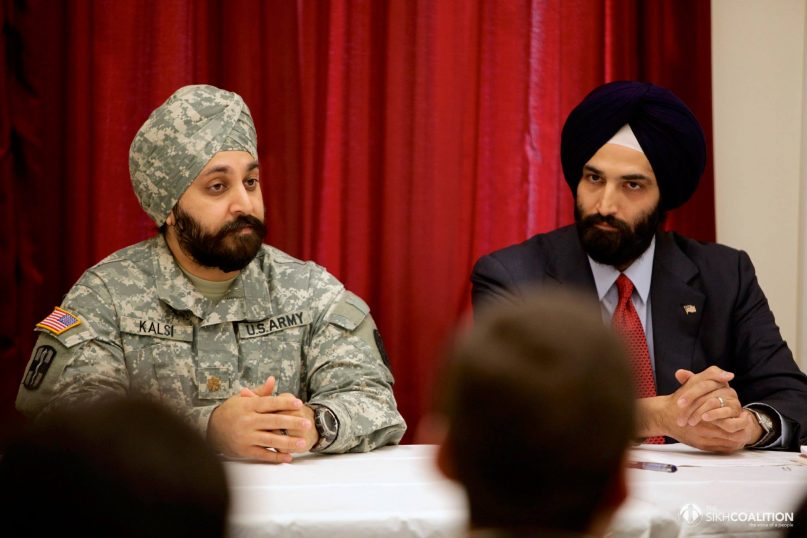WASHINGTON (RNS) Sikh leaders who have pushed for greater religious accommodation from the Pentagon say an updated policy on uniform and grooming standards is a welcome step but nonetheless maintains “the presumptive ban on Sikh articles of faith.”
On Wednesday (Jan. 22), the Pentagon released an updated “instruction” on accommodating religious practices, saying that requests will be honored “unless they have an adverse effect on military readiness, mission accomplishment, unit cohesion, and good order and discipline,” said Lt. Cmdr. Nate Christensen, a Defense Department spokesman.
Rajdeep Singh, director of law and policy for the Sikh Coalition, said the rules “fall short” of Sikh leaders’ hopes for greater accommodation.
“If a Sikh wants to join the military under the new rules, there is no guarantee that he will be granted a religious accommodation,” he said. “Even if an accommodation is granted, it can be revoked at any time under the new rules if you’re transferred to a new duty station or base.”
Asked about the Sikhs’ concerns, Christensen said that he could only discuss the policy — which addresses everything from tattoos to holy days — and the military would deal with requests on a case-by-case basis. Factors determining whether a request can be granted include whether religious apparel interferes with protective equipment such as helmets and masks.
Three Sikh military members accepted into the military since 2009 have proved that they can meet such requirements while maintaining their practices of wearing beards and turbans, Singh said. It is an article of faith for Sikh men to wear beards and to not cut their hair.

On Jan. 8, 2014, Maj. Kamaljeet Singh Kalsi, left, with Amandeep Singh Sidhu from the law firm McDermott Will & Emery, delivered a policy briefing to congressional staff on barriers to religious liberty for Sikh Americans who wish to serve in the U.S. armed forces. Photo courtesy of © The Sikh Coalition | Photo by Susan Biddle
“Sikhs are able to wear smaller turbans that can fit under helmets,” he said.
Sikhs such as Maj. Kamaljeet Singh Kalsi, a Bronze Star medalist who recently addressed a Capitol Hill briefing on religious liberty, sometimes wear a turban made out of camouflage material.
Other religious groups that have worked for accommodation, meanwhile, hailed the new regulations.
“We welcome the important decision to broaden the religious rights of American military personnel and hope this updated policy will allow all those in uniform to practice their faith while serving the nation,” said Nihad Awad, national executive director of the Council on American-Islamic Relations.
Hiram Sasser, director of litigation for Liberty Institute, said the burden for acceptance of religious practice will now be with the Department of Defense, not the service member.
“DOD must prove its case and the individual service member engaging in religious speech automatically gets the benefit of the doubt,” he said.
Rabbi Sanford Dresin, director of military programs for the Florida-based Aleph Institute, helped an Orthodox Hasidic rabbi win a case in 2011 that permitted him to keep his beard and serve as an active-duty military chaplain.
“I feel that DOD has heretofore talked about diversity and multiculturalism,” he said, “and now they’re putting their money where their mouth is.”
He said Rabbi Menachem Stern’s beard did not prevent him from passing the necessary tests for using a gas mask.
Dresin said his only concern is whether the individual military services will implement the updated policy without extra roadblocks.
“They’ve learned to live with the repeal of DADT (Don’t Ask/Don’t Tell) and so I think they can get along very well with yarmulkes and beards,” he said.
KRE/MG END BANKS





